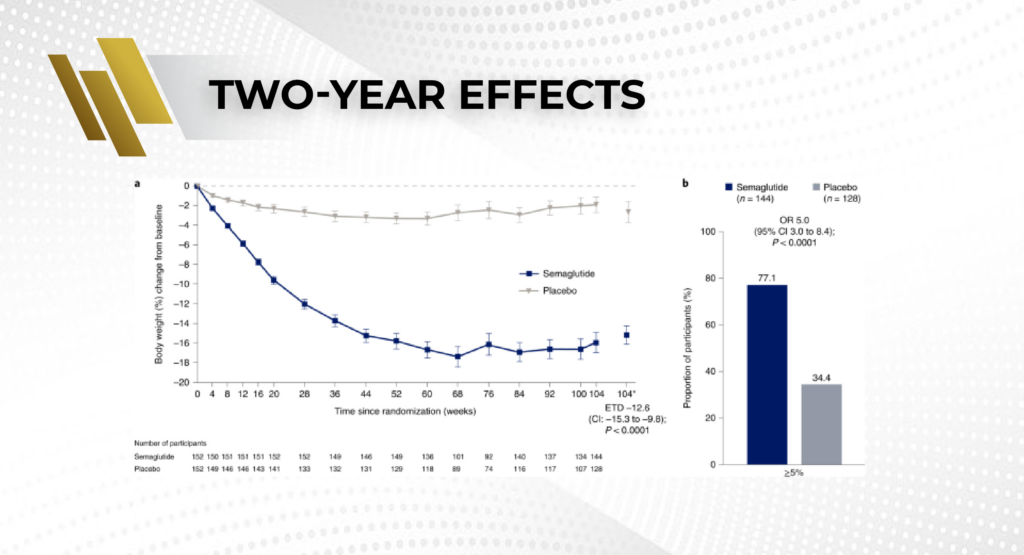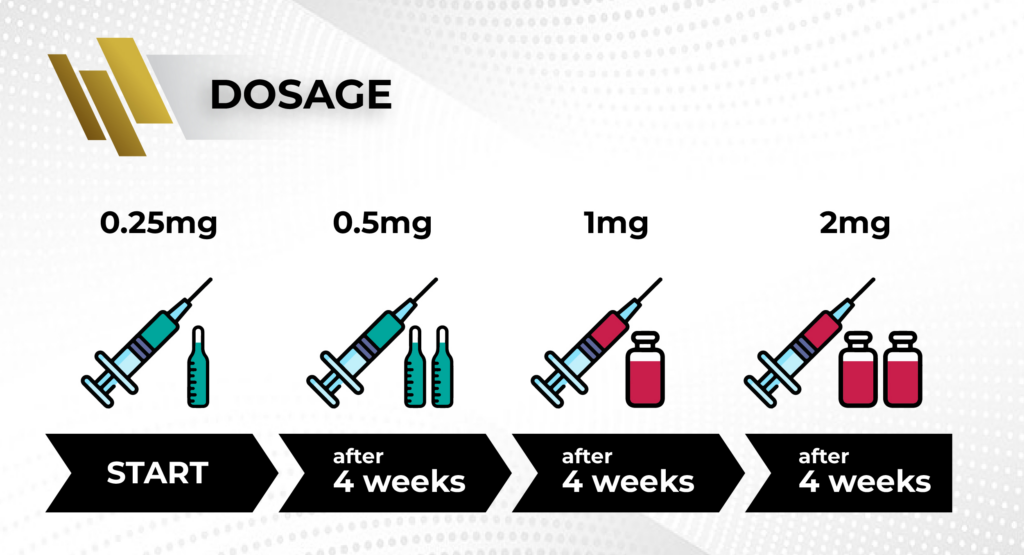Muscle Insider
New member

In the realm of innovative solutions for weight management, Semaglutide emerges as a promising contender. This groundbreaking medication, originally developed for diabetes management, has garnered attention for its potential in aiding weight loss. As a glucagon-like peptide-1 (GLP-1) receptor agonist, Semaglutide influences appetite and food intake, offering a novel approach to addressing obesity.
Recent clinical trials have demonstrated its efficacy in promoting substantial weight reduction. This article delves into the mechanism of Semaglutide, its impact on weight loss, and the implications of this pharmaceutical advancement for individuals striving to achieve and maintain a healthier body weight.
Understanding Semaglutide
Semaglutide, a significant advancement in pharmaceuticals, traces its origins to the broader category of GLP-1 receptor agonists designed for diabetes treatment. Developed by Novo Nordisk, it is an analog of natural human GLP-1 hormone, intended to enhance insulin secretion and regulate blood sugar levels.
Initially, Semaglutide gained recognition for its efficacy in managing diabetes. However, its evolution into a potential weight loss solution unfolded through subsequent clinical trials.
The groundbreaking STEP program (Semaglutide Treatment Effect in People with Obesity) showcased remarkable results, leading to the FDA approval of Semaglutide as a prescription medication for chronic weight management in 2021.
Semaglutide Mechanism of Action
Semaglutide operates through a sophisticated mechanism of action rooted in its role as a glucagon-like peptide-1 (GLP-1) receptor agonist. GLP-1 is a natural hormone that plays a crucial role in glucose homeostasis and satiety.

Semaglutide, being an analog of human GLP-1, mimics the actions of this hormone to bring about several physiological changes.
[*]GLP-1 Receptor Binding: Semaglutide binds to and activates the GLP-1 receptors on various cells, primarily in the pancreas and the brain. These receptors are present on beta cells in the pancreas, where insulin is produced, and in the central nervous system, particularly the hypothalamus, which regulates appetite.
[*]Insulin Secretion: In the pancreas, Semaglutide enhances glucose-dependent insulin secretion. This means that it stimulates the release of insulin in response to elevated blood glucose levels. This effect helps lower blood sugar levels, making it a valuable tool in managing diabetes.
[*]Glucagon Suppression: Semaglutide also inhibits the release of glucagon, another hormone produced by the pancreas. Glucagon typically raises blood sugar levels by promoting the release of glucose from the liver. By suppressing glucagon, Semaglutide contributes to the overall reduction of blood sugar.
[*]Appetite Regulation: One of the key aspects of Semaglutide’s mechanism is its impact on appetite regulation. When GLP-1 receptors in the brain, particularly the hypothalamus, are activated, it leads to increased feelings of fullness (satiety). This results in a reduced desire to eat, helping individuals control their food intake.
[*]Gastric Emptying: Semaglutide slows down the emptying of the stomach. This delayed gastric emptying contributes to prolonged feelings of fullness after meals, further aiding in weight management.
The cumulative effect of these actions makes Semaglutide a multi-faceted tool for managing both diabetes and obesity.
In the context of weight loss, its influence on appetite, food intake, and gastric emptying is particularly significant. The intricate interplay of Semaglutide with the endocrine and neural systems showcases its potential to address the complex factors contributing to obesity, marking a transformative development in the field of metabolic health.
Semagutide SourcesSemaglutide (GLP-1) for Sale
Semaglutide gets grouped with other Peptides but is more commonly known as a GLP-1 receptor agonist. It mimics the action of human incretin glucagon-like peptide-1 (GLP-1).
This is something that you would want when trying to lose weight, and this is why Semaglutide is being used as an anti-obesity medication (combined with a good diet and training plan). It is simply a method of glycemic control. [1,2]
When trying to lose weight or even trying to increase weight dramatically (bulking), glycemic control could help a tremendous amount.
Semaglutide will help your pancreas release the right amount of insulin when your blood sugar is high. So, it helps your body produce the correct amount of insulin needed.
This can help you avoid chronically high levels of blood sugar, which can have some severe impacts on your health. Fitness fanatics will also know that elevated blood sugar levels are one of the major causes of inflammation, fat gain, and heart disease.








? Men/Women: Men and women
 Go to the Full review
Go to the Full review [/i]
- Increases insulin control
- Decreases hunger
- Pain at the injection site
- Allergic reaction
Semaglutide Before and After Transformations
Lana Rodriguez – Lost 30 Pounds
Lana Rodriguez, 37, embarked on a regimen of semaglutide administered via a weekly injection in September 2022, addressing a history of binge eating and weight cycling.
By January 2023, a notable weight loss of 30 pounds brought satisfaction with her body, prompting a transition to a bi-weekly injection schedule in the pursuit of weight maintenance.
Speaking to Insider, Rodriguez, residing in Colorado Springs, Colorado, highlighted the significant advantages of the medication:
- Liberation from the need to meticulously regulate portion sizes.
- Elimination of the internal “food noise” that previously occupied her thoughts.
In her own words, “It’s the most positive change in my life.” (source)
Pepper Schwartz – Lost 30 Pounds

Pepper Schwartz, not diagnosed with Type 2 diabetes, shared that she initiated off-label use of Ozempic in 2022. This decision followed her doctor’s recommendation and subsequent medical assessments, deeming it suitable for her circumstances. Prescribed by her personal physician, Schwartz experienced a weight loss of approximately 30 pounds, which has since stabilized and is being maintained.
Residing in Snoqualmie, Washington, the 78-year-old Schwartz reflected on her health-oriented perspective: “I have really thought about this in terms of health a lot. I’m older. I just don’t think I can afford to (mess) around with weight anymore.”
In an interview with TODAY.com in April 2023, she expressed satisfaction with the positive impacts on her health, including low blood pressure and cholesterol. Schwartz emphasized that these health benefits are now her primary motivations, shifting away from the goal of fitting into a size 4 dress. (source)
Does Semaglutide have FDA Approval for Weight Loss?
Yes. In an article published in 2021, the FDA spoke about Semaglutide treatment as a means for weight loss, weight management, and ensuring weight loss outcomes are healthy and sustainable. Some of the more memorable parts of the article include:
“Today, the U.S. Food and Drug Administration approved Wegovy (semaglutide) injection (2.4 mg once weekly) for chronic weight management in adults with obesity or overweight with at least one weight-related condition (such as high blood pressure, type 2 diabetes, or high cholesterol), for use in addition to a reduced calorie diet and increased physical activity.”
“The drug is indicated for chronic weight management in patients with a body mass index (BMI) of 27 kg/m2 or greater who have at least one weight-related ailment or in patients with a BMI of 30 kg/m2 or greater.”
Semaglutide and Its Impact on Weight Loss
Several studies have been published looking at the effects of Semaglutide injections on weight loss:
Weight Loss Outcomes Associated With Semaglutide Treatment for Patients With Overweight or Obesity
This study which was published in 2022 looked at the effects of Semaglutide weekly 1.7-mg or 2.4-mg subcutaneous injections for 3 to 6 months. The outcomes were as follows:
- “The results of this cohort study suggest that weekly 1.7-mg and 2.4-mg doses of semaglutide were associated with weight loss similar to that seen in randomized clinical trials”
- 3 months: Average weight loss of 4.4kg
- 6 months: Average weight loss of 6.6kg
Two-year effects of semaglutide in adults with overweight or obesity: the STEP 5 trial
This study which was also published in 2022 looked at 2.34mg Semaglutide treatment. over the course of two years. The outcomes were as follows:
- “In STEP 5, once-weekly treatment with semaglutide 2.4?mg as an adjunct to behavioral intervention in adults with overweight (with at least one weight-related comorbidity) or obesity led to a substantial initial reduction in weight, which plateaued after approximately week 60 and was maintained for the remainder of the study.”

Effectiveness in Different Patient Groups
While there are too many patient groups to identify and compare, we can allude to certain attributes that might improve or decrease your chances of successful weight loss:
- More muscle mass will always make your weight loss journey a lot easier due to the increase in basal metabolic rate
- Following a Healthy Diet: Following a healthy diet that is focused on blood sugar regulation, weight control, and healthy food choices will always improve your weight loss endeavors
- Regular exercise: This is a no-brainer. If you practice regular exercise through resistance training and cardio as well, you’re going to achieve a healthy weight much faster
- Women: Women will lose weight slower than men. This is due to the reason that females carry more fat in general than men, and due to increased Testosterone in men, they will be able to build muscle mass faster and achieve weight loss faster as well
- Age: In general, the older we are the slower we lose weight
Semaglutide Dosage and Administration

Again, we have to go to the FDA to understand which dosages are safe and provide potential benefits with the least risk of side effects. According to the FDA, dosage requirements are as follow:
- Start at 0.25 mg once weekly. After 4 weeks, increase the dose to 0.5 mg once weekly.
- If additional glycemic control is needed, increase the dose to 1 mg once weekly after at least 4 weeks on the 0.5 mg dose
- If additional glycemic control is needed, increase the dose to 2 mg once weekly after at least 4 weeks on the 1 mg dose
- Administer once weekly at any time of day, with or without meals
- If a dose is missed administer it within 5 days of missed dose
- Inject subcutaneously in the abdomen, thigh, or upper arm
Now, this is certainly geared toward taking Ozempic and Semaglutide in order to combat or manage diabetes. When it comes to weight loss, dosages will vary depending on your needs and what your doctor will deem effective and safe.
Recommended Dosage
As mentioned, the recommended dosage (diabetes medication) will start at around 0.25mg once per week and build towards 2mg per week, and change as necessary. The numbers will vary from patient to patient, and it is thus essential that you discuss your diabetes care with your healthcare provider or healthcare professionals.
Semaglutide Administration Process
[*]Gather Supplies:
- Semaglutide pen or syringe as prescribed by your healthcare provider.
- Alcohol swabs.
- Sharps container for safe disposal.
[*]Wash Hands:
- Begin by washing your hands thoroughly with soap and water.
[*]Check Medication:
- Ensure you have the correct medication, and check the expiration date.
[*]Prepare Injection Site:
- Choose an injection site recommended by your healthcare provider (e.g., abdomen or thigh).
- Wipe the chosen area with an alcohol swab and let it dry.
[*]Prepare the Pen or Syringe:
- If using a pen, attach the needle as per the instructions.
- If using a syringe, draw the correct dose of semaglutide into the syringe as directed by your healthcare provider.
[*]Remove Air Bubbles:
- If there are air bubbles in the syringe, gently tap it to move the bubbles to the top, and then push them out without expelling medication.
[*]Injecting:
- Pinch the skin at the injection site.
- Insert the needle at a 90-degree angle if you have enough subcutaneous fat, or at a 45-degree angle if you have less fat. Follow your healthcare provider’s instructions.
- Inject the medication slowly and steadily.
[*]Hold and Remove:
- Hold the needle in place for a few seconds before withdrawing it.
- Dispose of the used needle in a sharps container.
[*]Inspect and Store:
- Check if there’s bleeding at the injection site.
- Store the pen or syringe as per the manufacturer’s instructions.
[*]Record the Injection:
- Keep a record of the date, time, and location of each injection, as advised by your healthcare provider.
Common Side Effects of Semaglutide
According to the FDA, the following precautions need to be taken into account when using Semaglutide:
- Pancreatitis: Has been reported in clinical trials. Discontinue promptly if pancreatitis is suspected. Do not restart if pancreatitis is confirmed
- Diabetic Retinopathy Complications: Has been reported in a clinical trial. Patients with a history of diabetic retinopathy should be monitored
- Never share an OZEMPIC pen between patients, even if the needle is changed
- Hypoglycemia: Concomitant use with an insulin secretagogue or insulin may increase the risk of hypoglycemia, including severe hypoglycemia. Reducing dose of insulin secretagogue or insulin may be necessary
- Acute Kidney Injury: Monitor renal function in patients with renal impairment reporting severe adverse gastrointestinal reactions
- Hypersensitivity Reactions: Serious hypersensitivity reactions (e.g., anaphylaxis and angioedema) have been reported. Discontinue OZEMPIC if suspected and promptly seek medical advice
- Acute Gallbladder Disease: If cholelithiasis or cholecystitis are suspected, gallbladder studies are indicated
With that said, there are some more common side effects present as well:
- nausea
- vomiting
- diarrhea
- abdominal pain
- constipation
- heartburn
- burping
Semaglutide Before and After: Addressing Common Myths
Semaglutide means I do not need to Exercise
Semaglutide can be life-changing, there is no doubt about that. This little subcutaneous injection can help you with appetite control, and appetite suppression, help you reach your weight goals, and much more. But it is still only an injectable drug. You still need to have proper exercise patterns, eating habits, and overall a good lifestyle to see optimal results.
The Weight Loss will Stay
While Semaglutide might aid weight loss, losing weight is often the easy part. The harder part is weight management after the initial weight loss journey. People who do not keep a healthy lifestyle and a healthy diet will simply regain the weight back, and then claim the medication did not work. It did, you however, did not put in the necessary work.
Conclusion
In conclusion, Semaglutide emerges as a groundbreaking solution for weight management, originally devised for diabetes treatment. Recent clinical trials, notably the STEP program, secured FDA approval in 2021 for chronic weight management. Its mechanism, rooted in GLP-1 receptor agonism, influences appetite, insulin secretion, and gastric emptying.
Real-life transformations, like Lana Rodriguez and Pepper Schwartz, underscore its efficacy. However, Semaglutide should complement a holistic approach, incorporating diet and exercise. FDA endorsement solidifies its role, but understanding dosage, administration, and potential side effects is vital. Dispelling myths, Semaglutide necessitates lifestyle changes for lasting health improvements in the dynamic field of metabolic health.
How much weight can you lose in a month with Semaglutide?
Depending on your initial insulin resistance, health status, and adherence to a healthy diet, you might lose up to 5 – 10 pounds per month.
Are there any dietary restrictions while on Semaglutide?
Not really, no.
What should I do if I miss a dose of Semaglutide?
If you miss a dose of Ozempic, use it as soon as possible within 5 days after your missed dose. If you miss a dose for more than 5 days, skip the missed dose.
Can you lose weight fast on Semaglutide?
Yes, you can. It will require regular exercise, better food choices, and a healthy lifestyle as well.
Can Semaglutide cause hair loss?
No, it cannot.
Click here to view the article.



